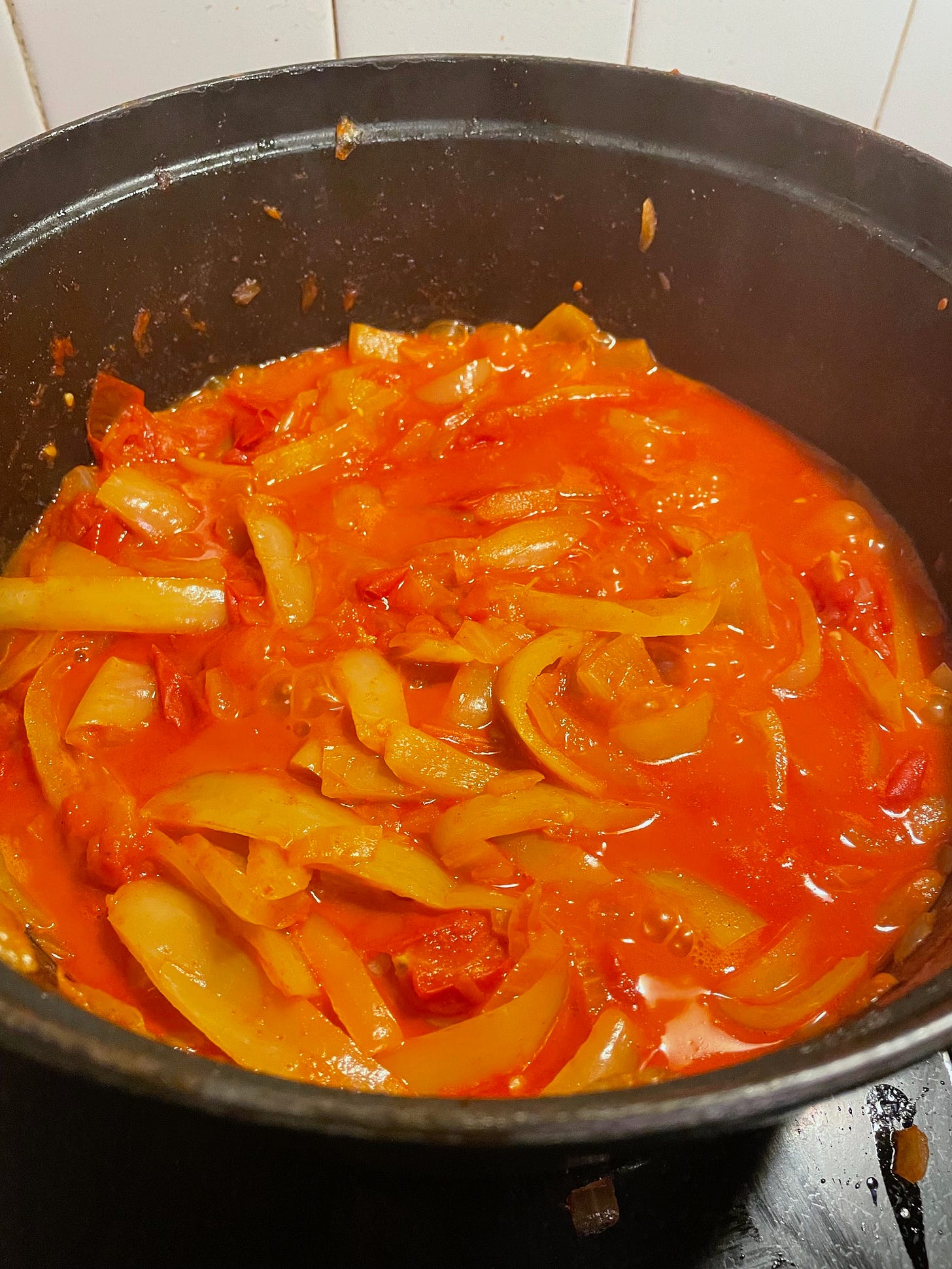When I worked as a UN "diplomat" outside Szentendre, 40 minutes from Budapest, I would walk every day into town to a csemege shop to purchase a "Hungarian pepper" and some paraszt kolbász (villager rustic sausage) and a "kifli" - Hungarian croissant - and that was my lunch.
Earlier we would go to the Fény utcai piac outdoor market near Moszkva tér in late summer when the stalls were piled high with magyar paprika and I would purchase big bags from the sad and old and tired village grandmothers. They travelled for at least an hour by bumpy yellow Volan busz with a few bags of their withered produce. All piled up into neat pyramids trying to attract that last desperate and perhaps sentimental customer. They smiled as best they could through a mouthful of painful silver capped teeth courtesy of Soviet era dentistry.
You gently fry an onion until it it translucent and then one half kilogram of Hungarian peppers and start to break it down. Maybe in a half hour you would add a good three or so tablespoons of Hungarian paprika and get it all melded together before adding your half kilo tomatoes cut up and then cook it all down. Long and low and slow. Let the liquid concentrate back into the vegetables.
Season it with salt.
Everyone has their own proportion.
It almost becomes a condiment. I used to make my big batch at the end of summer and in those days in the Hungarian winters there were NO vegetables in the market. Nothing. So I would thaw out some lecsó and crack an egg into it and serve it piled upon a félbarna Hungarian loaf of bread and it was a delicious fresh and vitamin C packed dinner in the bleak midwinter.
—
I walked back from Mass on Sundays from the Jézus Szíve Jezsuita Templom at the end of Mária utca and stopped at the tiny market on the corner of Gutenberg tér where we lived in the historic Gutenberg Művelődési otthon.
She was sitting alone in the flat when I returned after Sunday Mass with a half-kilo of freshly baked bread.
[The huge women dressed all in white with pure white head coverings baked it in the middle of the night even as late as the 1990s in central locations in state-oriented shops. Angels of the night. I would go and peep into their windows as they worked 20 pound mounds of bread dough like prizefighters.]
She did not go to Mass with me back in those days. That only came later with the kids. I grabbed a couple of bottles of strong and sweet Dreher Bak, some wine for her, along with the bread and I knew the lecsó was safely frozen at home waiting to heat up the desolation of winter. We looked out our window to the bleak inner balconies, draining Dreher and wine and perhaps some palinka. In those days it was not necessary to fill your days with activities. Go to Mass, cook your supper, and drink your fill to the sounds of Hungarian folk on the cassette player.
—
So today I did my best to recreate that magic with the miraculously appearing "Hungarian peppers" at our local store. No one was touching them because they had no idea what they were, but I got a good sized bag.
I made a pretty decent lecsó over the course of a couple of hours and served it atop a grilled chicken breast with that old standard petrezselymes burgonya (parsley potatoes) on the side in addition to a separate bowl of fokhagymás-tejfölös uborkasaláta (garlic and sour cream cucumber salad).
It brought back a lot of memories for me, even in those cold and bleak winters at our first flat on Arpad Fejedelem utja, where I would eagerly await delivery of my foreign subscription of the National Review magazine and would slink off to the subterranean wine cellar two blocks away to read the magazine from cover to cover - a secret vice -amidst the distracting stench of cigarettes, old wine stained into the fiber of the cellar, and rank body odor which is the smell of drunks. My table was wood, burned with cigarettes, and the woman kept bringing me 30cl glasses of red wine from an ancient and putrid wooden cask into which it was dispensed from large plastic containers from the lowest level "wineries" left over from communist times.
Everything is connected to everything else if you wait long enough.
Everything stays right where you left it
Right there where you left it
Lying upside down
When you finally find it
You'll see how it's faded
The underside is lighter
When you turn it around




Great story and I agree the poor village grandmothers struggling to smile just to survive touched my heart. Thank you Daniel.
This was a lovely story. It would be great to hear your story of how you ended up in the U.S. and associated with the great Ron Paul. I'm sure you have told it before but your writing is so descriptive I think you should write a book about it. Not kidding. You really should.